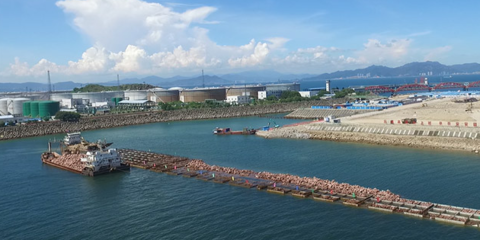Christos Stylianidis, the Cypriot-born technocrat who became Greek shipping minister in November, brought fresh air to the stodgy corridors of the ministry’s waterfront headquarters at Akti Vassileiadi in Piraeus.
Striking the right tone, particularly on decarbonisation, the 65-year-old gives the impression of being more in tune with global maritime sensitivities than the run-of-the-mill politicians who previously occupied the post.
One task of his brief, however, looks just as intractable as it has been for his predecessors: reviving the country’s ailing ship registry.
Despite being the world’s biggest shipowning nation, Greece’s role as a flag state has been steadily diminishing in a seemingly inexorable slide.
According to United Nations data, the Greek-flagged share of the global fleet in terms of dwt slid to 2.6% in 2023, down by more than half since the beginning of the century.
With a few notable exceptions, such as the Angelicoussis and Tsakos groups, domestic owners largely steer clear of their registry.
The most frequent public criticism local shipowners face is that about one-tenth of the Greek-controlled fleet flies the national flag.
Contrary to what most people believe, however, it is not greed or a lack of patriotism that informs their decision.
The main reason is the fleet’s growing size, combined with the flag’s strict Greek crewing requirements and a stubbornly small pool of local seafarers.
“Even though we want to, we can’t raise the Greek flag due to the lack of seafarers and that’s a pity,” shipowner Harry Vafias told a conference in Athens in May.
In a recent survey, the Athens-based Foundation for Economic & Industrial Research concurred.
“Limited availability of Greek crews … increases management cost and raises obstacles to the flag’s competitiveness,” it said.

In theory, the Greek flag could benefit from European Union rules obliging commercial fleets owned or managed out of the continent to put a growing number of their ships under European flags.
The need to comply with EU rules gained urgency after recent fleet measurements showed that the Greek fleet must step up efforts.
The Greek flag, however, is not the one benefiting. Instead, other EU flags such as Portugal’s are inundated with enquiries from local shipowners.
This is where the Greek registry’s other structural deficiencies come into play, largely its lack of digitalisation.
Shipowners now anticipate instant online documentation services from registries like the Portuguese, which transitioned to paperless operations years ago.
In his typically frank manner, Stylianidis admitted his own administration’s shortcomings when it comes to the registry’s digital services — or rather the lack of them.
“I know this has been plaguing you for years and it is something the state owes you an apology for,” he said in his first speech at a general assembly of the Union of Greek Shipowners in February.
It remains to be seen if Stylianidis can shake up the Greek registry and turn it around, from a nine-to-five civil service outfit to a service provider working around the clock.
To get there, the shipping ministry does not work just with the union but has also sought help from the country’s ministry of digital governance, which has worked wonders in recent years to cut bureaucracy for ordinary citizens.
“We have already set the e-registry in motion … we’re doing everything we can to speed things up because we’ve fallen behind, and it’s a pity,” Stylianidis said.(Copyright)





